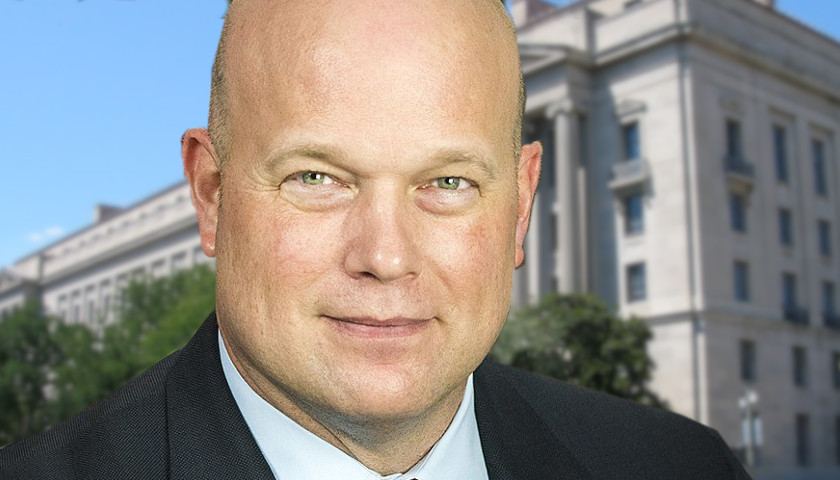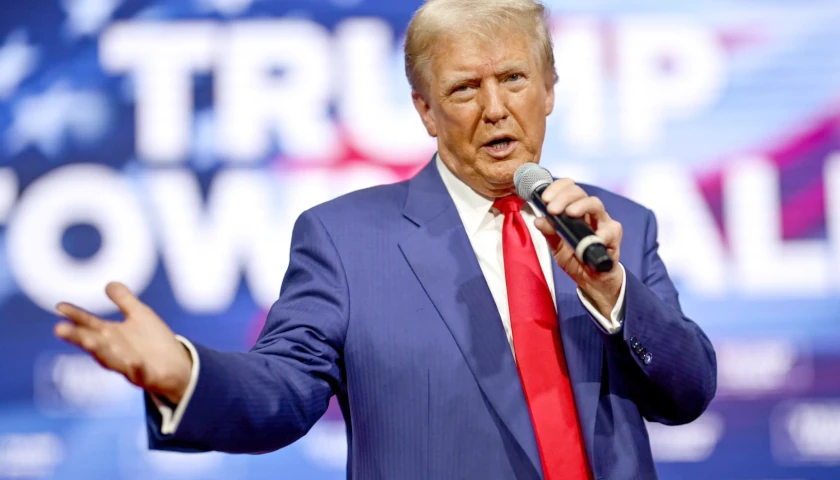by Fred Lucas
Acting Attorney General Matthew Whitaker went after Democratic and Republican politicians alike while serving as a federal prosecutor and as the head of an ethics watchdog group.
Now at the center of a political firestorm in Washington, Whitaker returns Wednesday to Iowa—the state where he made his name in both politics and sports.
Whitaker will deliver the opening remarks Wednesday at the Rural and Tribal Elder Justice Summit in Des Moines. The conference will focus on fighting and preventing elder abuse in rural and tribal communities.
But on Tuesday, the state of Maryland sued in federal court, claiming Whitaker’s appointment as acting attorney general was illegal because he was not confirmed for the office by the Senate. He was elevated to the post last week after President Donald Trump fired Attorney General Jeff Sessions, for whom Whitaker had served as chief of staff.
As a U.S. attorney for the Southern District of Iowa from 2004 to 2009, Whitaker prosecuted some 2,500 criminal cases, including against H-1B visa fraud, government contractors defrauding taxpayers, and drug dealers.
Whitaker first made a name for himself in Iowa years before, playing college football for the University of Iowa and competing in the Rose Bowl in 1991. The Hawkeyes lost to the Washington Huskies that year, 46-34.
In 2014, Whitaker became the executive director of the Foundation for Accountability and Civic Trust, a conservative government watchdog group.
Although he ran twice unsuccessfully for statewide office in Iowa as a Republican, for state treasurer in 2002 and in a 2014 Senate primary, FACT under his watch still targeted at least three House Republicans for ethics complaints.
“Matt is a lawyer’s lawyer,” Chuck Larson, a former U.S. ambassador to Latvia under President George W. Bush and former Iowa state legislator, told NPR. “He is not a politician who also has a law degree. He’s a very skilled attorney. But he also has good political instincts, and he’s pragmatic.”
Whitaker left FACT in the summer of 2017 to become chief of staff to Sessions. Last week, when Sessions resigned at Trump’s request, the president tapped him as the acting attorney general.
Democratic critics consistently cite comments Whitaker made in July 2017, representing FACT while working as a CNN analyst, where he was paid to give legal opinions. During one panel discussion, Whitaker said one “scenario” is that Trump names an attorney general that would cut funding to special counsel Robert Mueller’s probe of possible collusion between Trump and Russia “so low that his investigation grinds to almost a halt.”
Eligibility is not a frivolous question, said John Malcolm, head of the Institute for Constitutional Government at The Heritage Foundation, but he added that what Whitaker said as a CNN commentator isn’t legally relevant.
“He said things critical of the Mueller probe, but said those as a private citizen,” Malcolm told The Daily Signal. “Once he rejoined the Department of Justice, he will have access to the evidence that Mueller has gathered. There is no reason to believe he can’t act objectively on that. If he does something overtly political to halt the investigation, there will be consequences.”
Critics have also gone after Whitaker for serving on the advisory board of a patent company, World Patent Marketing, which the Federal Trade Commission determined last year had bilked customers by touting bogus success stories and did not deliver on promises to customers.
The FTC also asserted the company made legal threats against customers who complained.
But others cite Whitaker’s strong record as a U.S. attorney, among them Bud Cummins, who served as U.S. attorney for the Eastern District of Arkansas from 2001 to 2006 and part of whose tenure overlapped with Whitaker’s time in Iowa.
“When Matt was U.S. Attorney in the Southern District of Iowa from 2004 to 2009, he prosecuted thousands of cases involving drug dealers and violent felons,” Cummins wrote in a recent USA Today op-ed column.
“And like Sessions, Matt recognizes the importance of securing our borders, having prosecuted hundreds of illegal immigrants, as well as the masterminds behind a scheme to undermine America’s visa system,” Cummins wrote. “He understands the importance of government accountability and transparency, which is why he pursued government contractors who defrauded taxpayers.”
While serving as U.S. attorney, Whitaker also served on the Attorney General’s Advisory Committee. He served on subcommittees related to controlled substances and asset forfeiture, white-collar crime, and violent and organized crime.
Whitaker was a key player in multistate arrests in an H-1B visa fraud case, acting as media spokesman regarding operations in Iowa, California, Massachusetts, Texas, Pennsylvania, Kentucky, and New Jersey. The indictment said the fraud was used to undercut salaries of U.S. workers, while the visa recipients were paid prevailing wages.
The investigation was dubbed Operation Pacific Vision. The 2009 prosecution was “the result of an extensive, ongoing investigation into suspected H-1B visa fraud, mail fraud, and conspiracy,” Whitaker said.
The indictment alleged that the New Jersey-based information technology services firm Vision Systems Group submitted a Labor Condition Application that detailed prevailing wage data for a location in Iowa “rather than the prevailing wage where the worker would actually be employed.”
The law requires H-1B visa workers to be paid the prevailing wage, but that varies based on location. It would be significantly lower for computer programmers in Iowa than in New Jersey or California, for example.
The Justice Department settled the case in 2011, after Whitaker was out of office, with two of the 11 individuals charged pleading guilty and getting three-year suspended sentences. The company paid $236,250 in restitution to U.S. Citizenship and Immigration Services.
Whitaker wasn’t always successful in combating public corruption, however.
He led the prosecution of Iowa state Sen. Matt McCoy, charging McCoy, a Democrat, with attempted extortion, claiming he threatened to use his influence as a lawmaker to force a former business partner to pay him for distributing home monitoring devices for the elderly. A Des Moines jury acquitted the senator in 2007.
McCoy, who is still in office, recently claimed the prosecution was a “witch hunt.”
As the executive director of the Foundation for Accountability and Civic Trust, Whitaker used the Freedom of Information Act to obtain documents and call for government investigations into various public officials.
The bulk of complaints were filed with the House and Senate ethics committees, as well as the Justice Department, the Federal Election Commission, the Office of Government Ethics, and other executive branch agencies.
The majority of complaints filed were against Democrats, but under Whitaker’s watch, the group filed several complaints against Republican politicians as well.
In 2015, his group called for Rep. Robert Pittenger, R-N.C., to release a letter from the House Ethics Committee that approved the sale of his real estate business to his wife. Pittenger said at the time that such letters are traditionally confidential and that he was in full compliance with the law.
In 2015, it also asked the Office of Congressional Ethics to investigate the unintentional broadcast of Republican Rep. Charles Boustany’s staffers talking about the congressman’s opponent in a Louisiana U.S. Senate race. House ethics rules prohibit the use of House personnel or resources for political purposes.
A Boustany spokesman said at the time that the congressman immediately notified the House Ethics Committee himself after the conversation was aired, and the office was in compliance with rules.
That same year, FACT filed a complaint with the Federal Election Commission against both candidates in the 2012 Senate race in Missouri, Democratic Sen. Claire McCaskill and her opponent, then-Rep. Todd Akin, a Republican.
Other complaints that gained significant news media attention were against Democrats or Democratic-leaning groups.
The organization asked the Federal Election Commission to investigate Catalist, a voter data firm, and dozens of Democratic Party candidates’ committees working with the data to determine whether there was “an illegal coordination scheme” that allowed Democrats to sync their information with an independent group.
Under Whitaker’s leadership, the organization also asked for federal investigations into various associates of two-time presidential candidate Hillary Clinton and New York Mayor Bill de Blasio, among other prominent Democrats.
– – –
Fred Lucas is the White House correspondent for The Daily Signal and co-host of “The Right Side of History” podcast. Send an email to Fred. Donate now.





